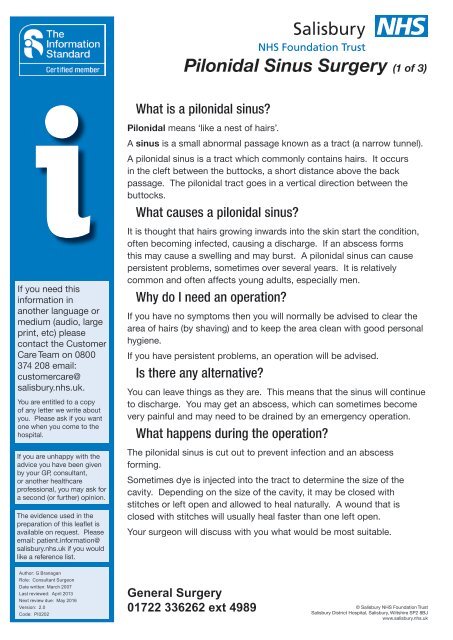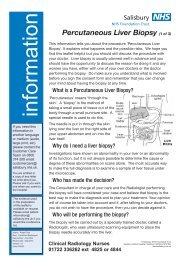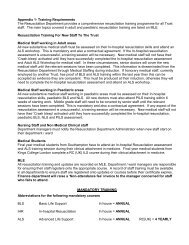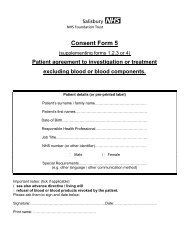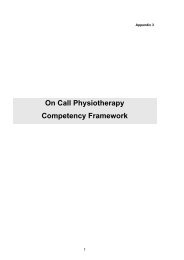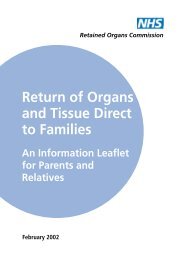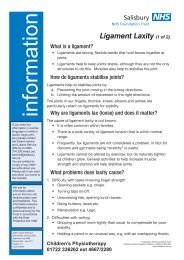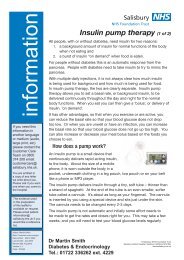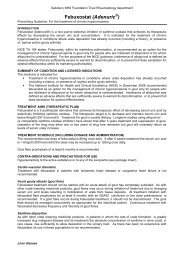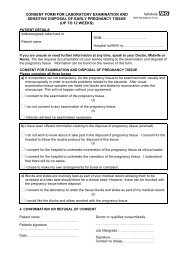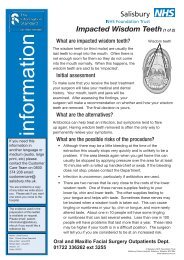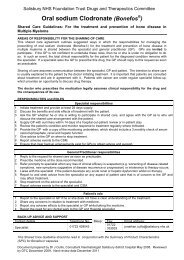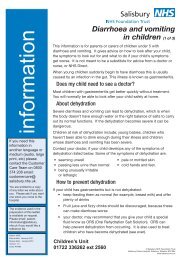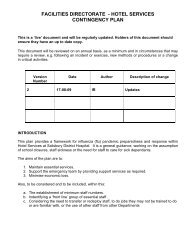Pilonidal Sinus Surgery - ICID - Salisbury NHS Foundation Trust
Pilonidal Sinus Surgery - ICID - Salisbury NHS Foundation Trust
Pilonidal Sinus Surgery - ICID - Salisbury NHS Foundation Trust
Create successful ePaper yourself
Turn your PDF publications into a flip-book with our unique Google optimized e-Paper software.
<strong>Pilonidal</strong> <strong>Sinus</strong> <strong>Surgery</strong> (1 of 3)<br />
i<br />
If you need this<br />
information in<br />
another language or<br />
medium (audio, large<br />
print, etc) please<br />
contact the Customer<br />
Care Team on 0800<br />
374 208 email:<br />
customercare@<br />
salisbury.nhs.uk.<br />
You are entitled to a copy<br />
of any letter we write about<br />
you. Please ask if you want<br />
one when you come to the<br />
hospital.<br />
If you are unhappy with the<br />
advice you have been given<br />
by your GP, consultant,<br />
or another healthcare<br />
professional, you may ask for<br />
a second (or further) opinion.<br />
The evidence used in the<br />
preparation of this leaflet is<br />
available on request. Please<br />
email: patient.information@<br />
salisbury.nhs.uk if you would<br />
like a reference list.<br />
What is a pilonidal sinus?<br />
<strong>Pilonidal</strong> means ‘like a nest of hairs’.<br />
A sinus is a small abnormal passage known as a tract (a narrow tunnel).<br />
A pilonidal sinus is a tract which commonly contains hairs. It occurs<br />
in the cleft between the buttocks, a short distance above the back<br />
passage. The pilonidal tract goes in a vertical direction between the<br />
buttocks.<br />
What causes a pilonidal sinus?<br />
It is thought that hairs growing inwards into the skin start the condition,<br />
often becoming infected, causing a discharge. If an abscess forms<br />
this may cause a swelling and may burst. A pilonidal sinus can cause<br />
persistent problems, sometimes over several years. It is relatively<br />
common and often affects young adults, especially men.<br />
Why do I need an operation?<br />
If you have no symptoms then you will normally be advised to clear the<br />
area of hairs (by shaving) and to keep the area clean with good personal<br />
hygiene.<br />
If you have persistent problems, an operation will be advised.<br />
Is there any alternative?<br />
You can leave things as they are. This means that the sinus will continue<br />
to discharge. You may get an abscess, which can sometimes become<br />
very painful and may need to be drained by an emergency operation.<br />
What happens during the operation?<br />
The pilonidal sinus is cut out to prevent infection and an abscess<br />
forming.<br />
Sometimes dye is injected into the tract to determine the size of the<br />
cavity. Depending on the size of the cavity, it may be closed with<br />
stitches or left open and allowed to heal naturally. A wound that is<br />
closed with stitches will usually heal faster than one left open.<br />
Your surgeon will discuss with you what would be most suitable.<br />
Author: G Branagan<br />
Role: Consultant Surgeon<br />
Date written: March 2007<br />
Last reviewed: April 2013<br />
Next review due: May 2016<br />
Version: 2.0<br />
Code: PI0202<br />
General <strong>Surgery</strong><br />
01722 336262 ext 4989<br />
© <strong>Salisbury</strong> <strong>NHS</strong> <strong>Foundation</strong> <strong>Trust</strong><br />
<strong>Salisbury</strong> District Hospital, <strong>Salisbury</strong>, Wiltshire SP2 8BJ<br />
www.salisbury.nhs.uk
What can go wrong?<br />
<strong>Pilonidal</strong> <strong>Sinus</strong> <strong>Surgery</strong> (2 of 3)<br />
<strong>Surgery</strong> for a pilonidal sinus is generally a very safe operation with few risks, but, as with<br />
any surgical procedure complications can occasionally occur:<br />
The risk What happens What can be done about it?<br />
Bleeding<br />
Blood may come through<br />
the wound or as a bruise<br />
afterwards<br />
Bleeding usually stops within<br />
a few minutes. Very rarely you<br />
may need to go back to theatre<br />
to have the bleeding stopped.<br />
Wound infection occurs in<br />
around 10% of patients.<br />
Consent<br />
You may be given antibiotics<br />
to take after the operation to<br />
help prevent this. Sometimes<br />
the stitches are removed and<br />
the wound left open to heal<br />
naturally.<br />
By law we must obtain written consent to the operation before it takes place. Staff will<br />
explain all the risks, benefits and alternatives before they ask you to sign a consent form. If<br />
you are unsure about any aspect of the treatment proposed, please do not hesitate to ask.<br />
Before you come into hospital<br />
To make sure that you are fit to have surgery, you will be asked to attend the pre-admission<br />
assessment clinic 1 - 6 weeks before the date of your surgery. Tests including a blood test,<br />
chest x-ray and tracing of the rhythm of your heart (ECG) may be done at this time.<br />
The operation is often performed as a day case. You will be able to go home on the day of<br />
operation.<br />
Less often, for medical reasons or because of home circumstances, the operation will be<br />
done as an in-patient. In this case you can usually go home on the day after the operation.<br />
Occasionally, patients who expect to go home on the day of surgery will need to stay in<br />
overnight.<br />
What can I expect after the operation?<br />
As soon as you are awake you will be able to eat and drink as you wish and to get up as<br />
soon as you feel able.<br />
When can I go back to work?<br />
The time taken to return to normal activities varies for different people. Do as much as you<br />
feel comfortable doing. You should not drive unless you feel ready and comfortable to do<br />
so. Check with your Insurance Company as policies vary. If you need to take painkillers,<br />
these may make you drowsy so you should avoid driving or operating machinery. Most<br />
General <strong>Surgery</strong><br />
01722 336262 ext 4989<br />
© <strong>Salisbury</strong> <strong>NHS</strong> <strong>Foundation</strong> <strong>Trust</strong><br />
<strong>Salisbury</strong> District Hospital, <strong>Salisbury</strong>, Wiltshire SP2 8BJ<br />
www.salisbury.nhs.uk
<strong>Pilonidal</strong> <strong>Sinus</strong> <strong>Surgery</strong> (3 of 3)<br />
people need a few days off work, but this will depend on what your job involves. If you<br />
need a sick certificate for work, please ask a member of staff for one before you go home.<br />
After your surgery<br />
It is very important that you keep the area clean. While you are in hospital you should bathe<br />
or shower after each bowel action. After a bowel action you should wipe toilet paper away<br />
from your wound. Women should remember to wipe from front to back, away from the<br />
vaginal area.<br />
Is there anything I should do when I go home?<br />
• Your wound dressing will need to be changed every day until the wound has<br />
completely healed. We will make arrangements for the district nurse to visit you<br />
at home, or you will be asked to visit your practice nurse at your local surgery.<br />
• Once you are home, taking a bath every time you open your bowels may not be<br />
practical, but you should continue to wash after each bowel action if at all possible for<br />
3 - 4 weeks after the operation. You may find that sitting on the edge of the bath and<br />
using a shower attachment (if you have one) is a convenient way of cleaning the area.<br />
• It is very important that hairs do not grow into the healing tract. Sometimes<br />
it may be necessary to shave any hairs that do grow. The doctor will<br />
discuss this with you when you come for your follow-up appointment.<br />
• Until your wound has completely healed try to avoid<br />
walking, or sitting still for long periods of time.<br />
• You should avoid going swimming until your wound has completely healed, as<br />
chlorine may affect healing and there is a risk of picking up or passing on an infection.<br />
• Wear loose-fitting trousers and pants as tight clothing can rub the wound.<br />
• You can resume sexual relations as soon as this feels comfortable.<br />
In the period after your operation you should contact your GP, the colorectal nurse<br />
specialist or the ward if you notice any of the following problems:<br />
• increasing pain, redness, swelling or discharge.<br />
• severe bleeding.<br />
General <strong>Surgery</strong><br />
01722 336262 ext 4989<br />
© <strong>Salisbury</strong> <strong>NHS</strong> <strong>Foundation</strong> <strong>Trust</strong><br />
<strong>Salisbury</strong> District Hospital, <strong>Salisbury</strong>, Wiltshire SP2 8BJ<br />
www.salisbury.nhs.uk


